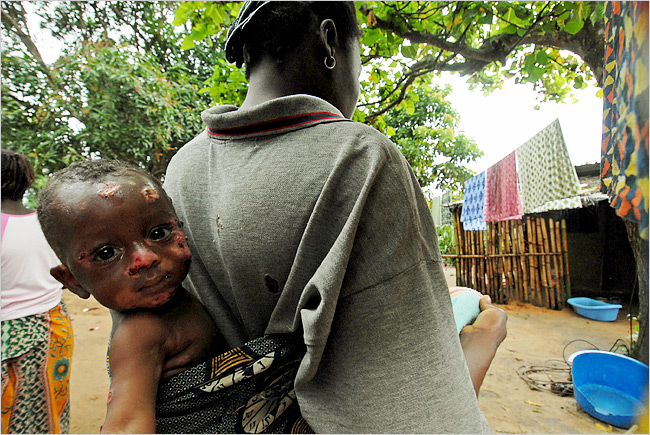
Dumping once again

This morning I read this article about toxic sludge being dumped by a tanker in the ocean and washing up on the shores of the Ivory Coast. The kid in the picture above has sores on his body from exposure to this stuff. People have gotten ill from exposure and inhalation of the pollutant and some have even died. Efforts are underway to clean-up and dispose of the waste. But, once a dumping action happens, it is so hard to contain and clean it up. Heinous events like this are inexcusable and I cannot believe more cannot be done to prevent them.
Companies and corporations have a great ability to damage our planet and need incentive to act responsibly. There is a serious need for a global environmental body of law and team of enforcers to make sure that the law is enforced. Where are the regulations we really need to make sure that things of this nature cease? We cannot keep dumping in our oceans and think that the waste will just disappear.
Whatever someone does in one place, in one country, in one moment, will impact the world.
I am reminded of a research trip I took to the island of San Salvador, located far east in the Bahamian Islands. While I was there, I took a trip out to the almost completely uninhabited eastern shore and hiked down to the beach from the road. I came around a bend in the path and was shocked at the site of garbage; garbage as far as the eye could see in all colors of the rainbow. Anything that floats and large pads of petroleum waste were polluting an otherwise pristine tropical beach. I was told that this garbage washed in from cruise ships and whoever else happened by and decided to dump their waste in the water. In investigating the waste, I found languages from around the globe including Japanese, Russian, and English. There are laws against this.
I remember when I was a kid in Connecticut, they shut down the beaches because medical waste was washing up on the shore.
There is not one place on the planet that has not felt human presence in the form of pollutants. Even in Antartica, coke cans sometimes wash up next to the penguins…
I am also reminded of images of sea birds covered in oil from the Exxon Valdez oil spill in Alaska, back in the 1980s. This tragedy prompted Congress to pass the Oil Pollution Act in 1990, tightening regulations on oil tankers.
I hope that the same will come out of this recent careless act in Africa.





